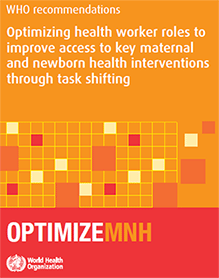Resource Spotlight: Optimizing Health Worker Roles to Improve Access to Key MNH Interventions through Task Shifting
Human resource shortages in the health services are widely acknowledged as a threat to the attainment of the health related Millennium Development Goals (MDGs). Attempts to optimize the potential of the existing health workforce are therefore crucial. A more rational distribution of tasks and responsibilities among cadres of health workers is seen as a promising strategy for improving access and cost effectiveness within health systems.
The objective of this guidance is to issue evidence-based recommendations to facilitate universal access to key, effective maternal and newborn interventions through the optimization of health worker roles. These recommendations are intended for health policymakers, managers and other stakeholders at a regional, national and international level. [ from summary]
View this resource.
The HRH Global Resource Center has other resources on this topic including:
- Task Shifting in Maternal and Newborn Care: A Non-Inferiority Study Examining Delegation of Antenatal Counseling to Lay Nurse Aides Supported by Job Aids in Benin
- Experiences, Opportunities and Challenges of Implementing Task Shifting in Underserved Remote Settings: The Case of Kongwa District, Central Tanzania
- Policy and Programmatic Implications of Task Shifting in Uganda: A Case Study
For additional resources on this topic, visit the Task Shifting and Maternal & Child Health subject categories.
Past Resource Spotlights
- 1395 reads





